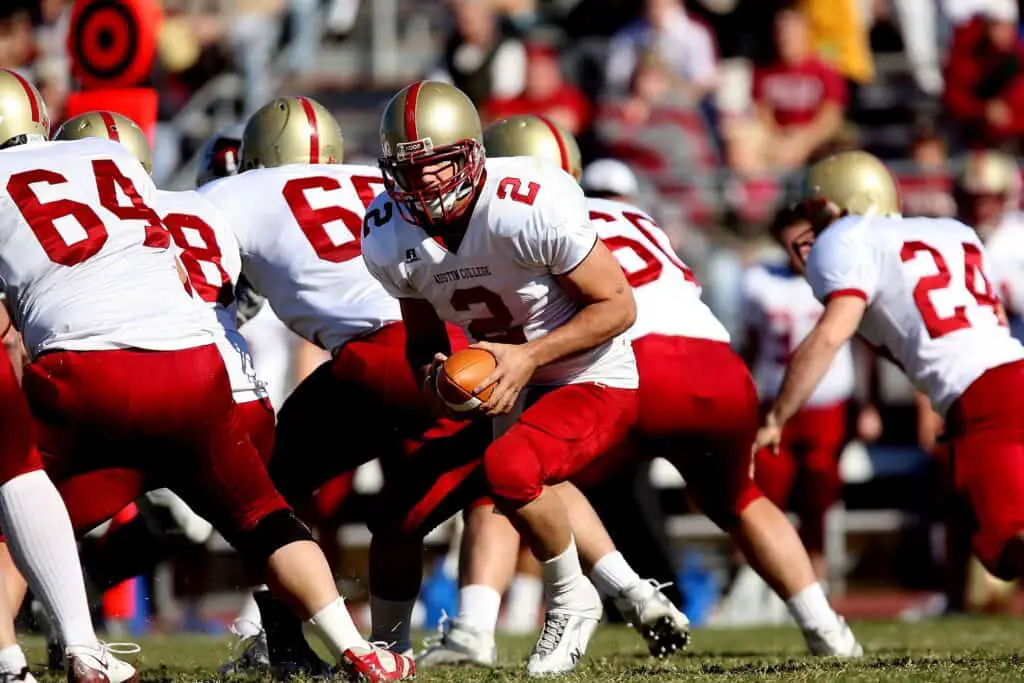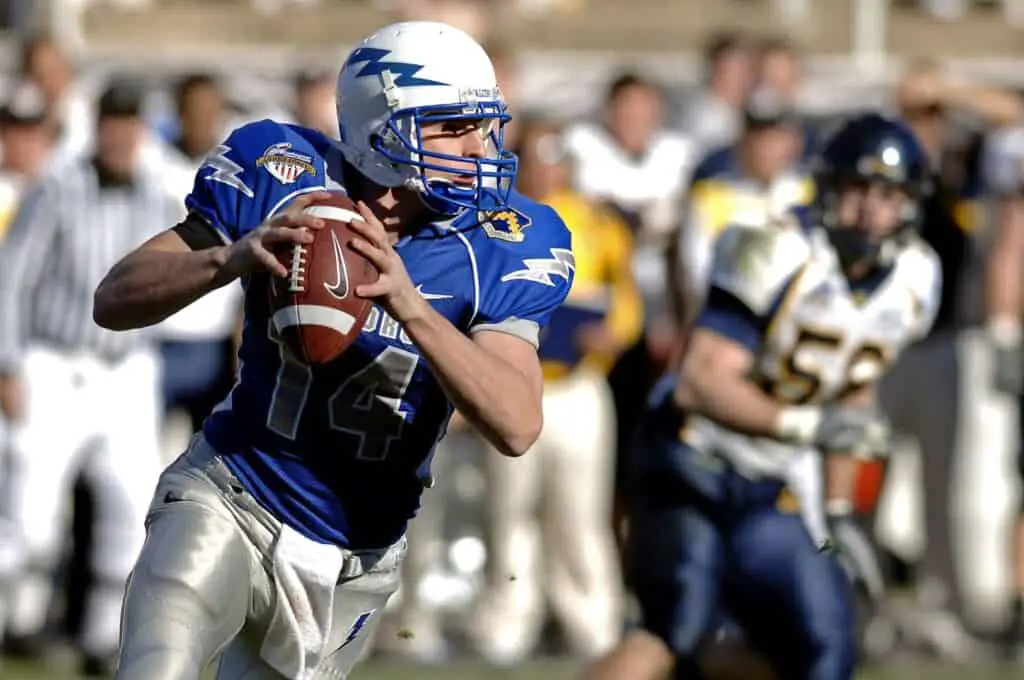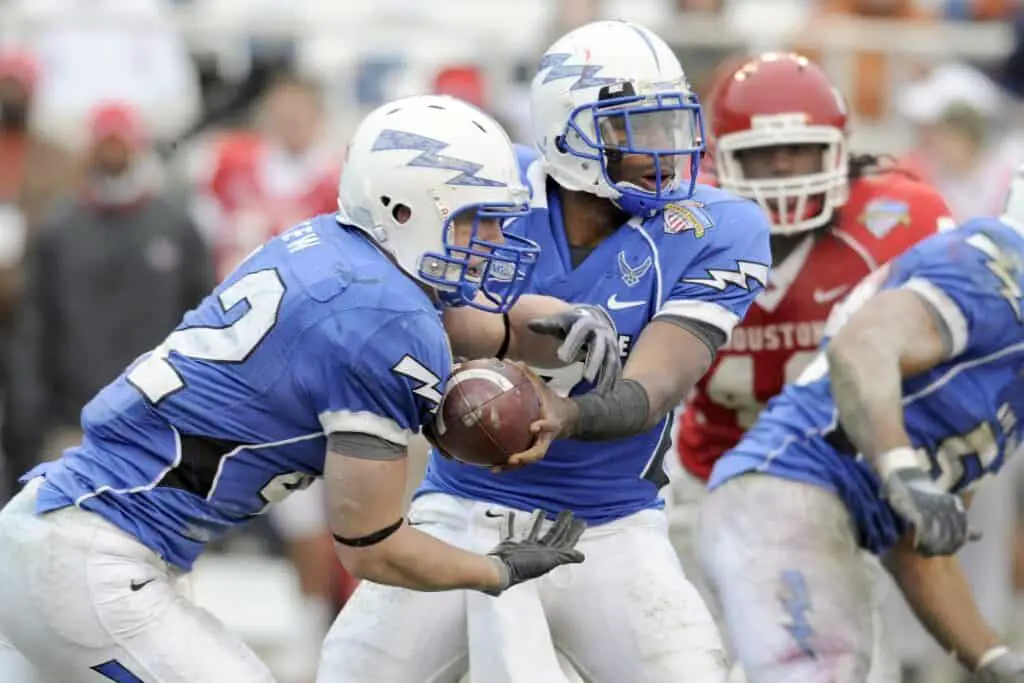Quarterback (QB, initially got back to hindering) is a situation in American and Canadian football. Quarterbacks are individuals from the offensive group and line up straightforwardly behind the offensive line. Quarterbacks are the heads of the offensive group, answerable for calling the play in the cluster.
A pocket passer is a quarterback who is normally exceptionally talented at standing tall and passing the football from inside the pocket, rather than a more portable quarterback who depends on contraband or alternative plays. In football, the pocket is the zone behind the offensive line where the quarterback remains after accepting the ball. The pocket is around seven yards wide and five yards in length.
Click here to view and buy great American football gadgets.

Quarterback (QB)
What is a Quarterback?
A position on the offense responsible for initiating the majority of offensive plays. The quarterback is transferring the play call to the remainder of the offense, changing the offense before the snap, taking the snap from the middle, and executing the play. That can involve giving the ball off to a running back, running the ball all alone, or endeavoring a pass downfield. Quarterbacks must have the ability to examine the guard and ought to have a solid, precise arm for downfield passes.
Sporting Charts explains Quarterback
The quarterback is the leader of an offense. Squads rely on a quarterback to perform plays as efficiently as reasonable. A quarterback has to be able to line his team up and evaluate the defense quickly, making any adjustments necessary to try and maximize the offense’s success. This can mean changing a play at the line of scrimmage, which is called a “discernible”. The quarterback is quite often liable for endeavoring passes downfield and must do as such while dodging the guarded pass surge. A powerful quarterback will submit not many turnovers and have a high finish rate.
Here are several exceptional cases plays the quarterback may need to call:

- Quarterback sneak
Teams operate this game when the offense requires a yard or slighter for an initial down. The quarterback takes an immediate snap from the middle and either jumps behind his middle or watchman or plunges between his gatekeeper and focus, wanting to increase the first down. - Shotgun snap
In passing circumstances when the group has numerous yards to go for a first down or score, quarterbacks at times take a shotgun snap: the quarterback stands 6 to 8 yards behind the middle and gets the ball through the air from the middle, much like a punter does. Beginning from the shotgun position, the quarterback doesn’t need to drop back. He can study the safeguard and focus on his collectors better. In any case, shielding against a quarterback who lines up in the shotgun position is simpler for the protective players, since they realize the play is probably going to be a pass rather than a run.
After the quarterback is in control of the ball, he turns and, contingent upon which play was called, takes one of the accompanying activities:
- Hands the ball to a running back.
- Runs with the ball himself.
- Moves further back and sets up to endeavor a pass. Contingent upon the plan of the offense, the quarterback makes a three-stride, five-step, or seven-venture drop before tossing the ball.
The region where the quarterback works, no doubt with a running back and the offensive line shielding him from the safeguard, is known as the pocket. It’s as wide as the situating of the quarterback’s offensive handles.
The quarterback’s fundamental employment is to toss the football and urge his colleagues to play well. In school, particularly if the group runs a spread development, the quarterback may run the ball as regularly as he passes, yet in the NFL, the quarterback infrequently runs with the ball.
Quarterback Pocket passer (QB pp)
What is Pocket Passer?
A quarterback who makes most of his passes from inside the passing pocket.

Sporting Charts clarifies Pocket Passer
The passing pocket, otherwise called the fishing supply bag, is a space in the backfield shaped by offensive linemen who make a mass of assurance that furnishes the quarterback with a satisfactory opportunity to execute a pass play. A pocket passer is a quarterback who is typically profoundly talented at standing tall and passing the football from inside the pocket, instead of a more portable quarterback who depends on contraband or alternative plays. Even though pocket passers are ordinarily seen as more cerebral and less athletic, the term is frequently credited to more experienced quarterbacks who can perform inconspicuous developments and step up in the pocket to evade pressure.
Instances of pocket passers are Peyton Manning, Tom Brady, and Drew Brees.
Pocket passer, pass on, for loads of reasons:
- Manziel, Newton, RGIII, and so forth are largely ready to be as amazing as they are a result of their passing abilities too. Manziel is an elusive sonuvabitch, yet if he’s no danger in the passing game you can simply stack the crate/spy him and not need to stress over getting beat profound.
- An offense predicated around alternative running/plays where the QB is here and there expected to have the ball must be viable if the offense has a genuine passing danger – it’s the reason the Wildcat has gotten fringe useless (fair off-subject inquiry: was the Wildcat ever that powerful?). Regardless of whether you have an Oregon-style course of action of utilizing screens once the safeguard stacks the container, you actually must have more than screens to dominate every one of your matches (no, Kiffin, sit down). You need a QB who can make great plays in the passing game to be powerful in any offense (holler to Georgia Tech)
- A great scrambling QB will by and large spare some messed up plays and get huge pieces (suppose 10ish) on plays he “shouldn’t.” A marvelous pocket-passing QB will have the option to make the better pre-snap peruses, and reliably get loads of yards per play routinely, and reliably. In case I’m a mentor, I need to strategy around a predictable offense. The pocket-passer will most likely be unable to Houdini out of a wrecked play, yet he’ll have the option to analyze protections better and there will be less broken plays.
- If the strategy rotates around tricky QB alternative stages that QB will get a strike, both harder and further repeatedly than a pocket-passer.
- A decent pocket passer can, as I would like to think, all the more viably exploit the players around him than a scrambling QB. Consider all the incomparable NFL QBs that originated from minuscule schools. They got great at tossing to inferior beneficiaries who weren’t unreasonably open. In case I’m a mentor I need the QB who can all the more viably exploit the entire group instead of depending on him to work some voodoo wizardry.
- Your normal slip-up in the running match-up made by a QB who isn’t that acceptable at scrambling: uh oh, TFL, lost a few yards. A normal mix-up in the passing game made by a QB who isn’t that acceptable at passing: uh oh, arm punt.
Conclusion
Playing quarterback is to get the show on the road out of your hands to your play producers and let them make the enormous plays and move the ball down the field. It’s the quarterback’s responsibility to get the show on the road to them. The principle disservice of a pocket-passer is only that, they are just effective in the pocket.